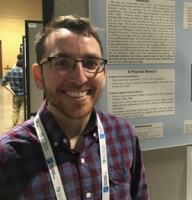Learning to Problem Solve
If you run into problems or have questions while doing your research, the first thing you should do is try to solve the problem on your own. You are probably not the first person to have that problem and the answer may be pretty easy to find. Not surprisingly, one of the best tools for troubleshooting is Google. If you have googled your problem extensively and couldn't find a solution, or if you don't understand the solutions that you found, only then is it time to ask around for help.
Ask your advisor
Don't hide your struggles from your advisor! It is important that they are aware of the things that you understand well, and the things that you have some trouble with. This will help them to help you complete your project. They are there to answer your questions, guide you through your research project, and help you become a self-sufficient researcher. Sometimes they may give you an answer to your problem, but other times they may direct you to a paper or book to read. A great way to get help if you are struggling to understand a topic is to ask you advisor to recommend papers for you to read.
Ask a grad student
The majority of the grad students will be around the department throughout the summer. If you have any questions about programming, other research skills, professional conduct, or general questions about being in grad school, chances are that a grad student has an answer for you or can point you towards someone who does. It is common for students who are just starting research to hesitate to ask their advisors small questions (such as how to open an unusual file or how to search online for a paper) and this unnecessarily delays the progress of research. You only have a short amount of time at UT over the summer, so if you have a small question that you couldn't find an answer for on your own, do not hesitate to ask any of the friendly grad students in the list below for help.
|
|
 Yao-Lun Yang Office: 15.310E Research: galactic star formation and astrochemistry. spectroscopy, line fitting, radiative transfer, and data reduction for Herschel and ALMA Tools: python, IDL, CASA, and HIP |
|
Tyler Nelson |
 Boyuan Liu Office: 16.226a Research: simulation of first stars and galaxies in different dark matter models Tools: python, Gadget/GIZMO, yt, caesar, MUSIC, TACC |
 Patrick Drew Office: 16.307 Research: Dusty Star Forming Galaxies/high redshift galaxies, spectroscopy, SEDs Tools: python, ds9, IRAF, galfit |
(more coming soon) |
Astronomy Blogs
- Astrobites is a daily journal written by grad students for undergrads that primarily publishes summaries of recent papers. They also occasionally publish articles about career paths, current events, and the individual experiences of the many authors. The authors are from universities around the world (and our own Benny Tsang is an author) which allows for many different perspectives.
- Astrobetter is a blog written by a group of grad students, post-docs, and professors who seek to improve to way that astronomers communicate about the tips and tricks they learn while doing research. The posts generally focus on software, research techniques, or astronomy education, among other topics.


